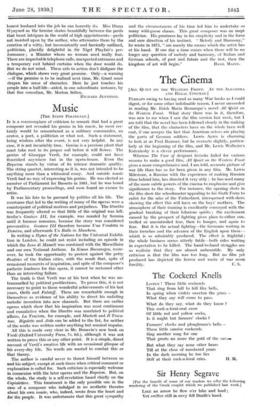Music
[THE INEPT POLITICIAN.]
IT is a commonplace of criticism to remark that had a great composer not revealed his genius in his music, he most cer- tainly would be remembered as a military commander, an orator, a poet, a politician or what not. Such a statement, being wisdom after the event, is not very helpful. In any case, it is not invariably true. Genius is a precious plant that must take root in its proper soil before it will flower. The genius of Giuseppe Verdi, for example, could not have flourished anywhere but in the opera-house. Even the Requiem stands by virtue of its intense dramatic quality. The string quartet, interesting as it is, was not intended to be anything more than a whimsical essay. And outside music Verdi had no way of expressing his genius. He was elected as member of Parliament for Busseto in 1861, but he was bored by Parliamentary proceedings, and soon found an excuse to retire.
It was his fate to be pursued by politics all his life. The overtures that led to the writing of many of the operas were a counterpoint of political motives and prejudices. The libretto was frequently altered so that little of the original was left. Scribe's Gustave III, for example, was mauled by Somma until it became nonsense, because the story was considered provocative. Gustave III therefore became Una Vendetta in Domino, and afterwards Un Ballo in Maschera.
In writing a Hymn of the Nations for the Universal Exhibi- tion in London, he could not resist including an episode in which the Info di Matneli was combined with the Marseillaise and our own National Anthem. In Simon Boccanegra, more- over, he took the opportunity to protest against the petty rivalries of the Italian cities, with the result that, spite of occasional moments of inspiration, and spite of the composer's pathetic fondness for this opera, it cannot be reckoned other than an interesting failure.
The truth is that Verdi was at his best when he was un- trammelled by political predilections. To prove this, it is not necessary to point to those wonderful achievements of his last years, Otello and Falstaff. These are remarkable enough in themselves as evidence of his ability to direct his unfailing melodic invention into new channels. But there are earlier operas which show that his inspiration was most continuous and cumulative when the libretto was unrelated to political affairs, La Traviata, for example, and Macbeth and Ii Trova- tore. Rigoletto and Aida can be added to the list, for neither of the works was written under anything but musical impulse.
All this is made very clear in Mr. Bonavia's new book on Verdi (Oxford University Press, 7s. 6d.), although it was not written to prove this or any other point. It is a simple, direct account of Verdi's creative life with an occasional glimpse of his every-day life. No words are wasted to combat this or that theory.
The author is careful never to thrust himself between us and his subject, except at such times when critical comment or explanation is called for. Such criticism is especially welcome in connexion with the later operas and the Requiem. But, on the whole, the study is a self-revelation based chiefly on the Copialettere. This treatment is the only possible one in the case of a composer who indulged in no aesthetic theories about his own music, who, indeed, wrote from the heart and for the people. It was unfortunate that this great sympathy and the circumstances of his time led him to undertake so many wild-goose chases. This great composer was an inept politician. His greatness lay in his simplicity and in the force and sure direction of his instinct. "Melody and Harmony," he wrote in 1875, "are merely the means which the artist has at his hand. If one day a time comes when there will be no longer any question of melody and harmony, of Italian and German schools, of past and future and the rest, then the


















































 Previous page
Previous page